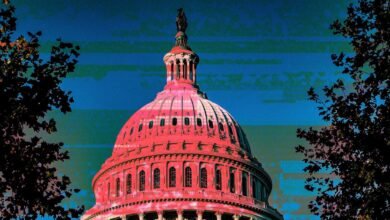Sen. Blackburn Drops AI Moratorium Support in Trump’s Bill After Backlash

▼ Summary
– Congress is revising President Trump’s bill, including a contentious AI moratorium provision that originally proposed a 10-year pause on state AI regulations.
– The provision, initially backed by White House AI czar David Sacks, faced opposition from diverse groups, leading to a revised five-year moratorium with carve-outs.
– Senator Marsha Blackburn initially opposed the moratorium, supported a compromise, then reversed her stance, citing risks to kids, creators, and conservatives.
– The revised moratorium included exemptions for laws protecting likeness, child safety, and deceptive practices but was criticized for shielding Big Tech from regulation.
– Critics argue the provision’s “undue burden” clause could block state regulations on AI, creating a legal shield for tech companies against litigation.
The debate over AI regulation intensifies as lawmakers scramble to revise controversial provisions in President Trump’s latest legislative push. What began as a proposed decade-long freeze on state-level artificial intelligence rules has now become a political lightning rod, forcing key supporters to backtrack amid mounting criticism.
Senator Marsha Blackburn, once a vocal advocate for the measure, withdrew her support after public backlash labeled the revised five-year moratorium a “loophole for tech giants.” Her abrupt reversal highlights the growing tension between federal oversight and states’ rights in governing emerging technologies. “This isn’t about stifling innovation, it’s about preventing exploitation,” Blackburn emphasized, referencing concerns over child safety, privacy, and the unchecked use of AI-generated content.
Originally drafted with input from White House advisor David Sacks, the provision aimed to standardize AI policies nationwide. But opposition emerged swiftly, uniting unlikely allies, from progressive labor unions to conservative firebrands like Marjorie Taylor Greene. Critics argued the moratorium would handcuff states from addressing urgent risks, such as deepfake scams or algorithmic bias, while giving corporations years to entrench harmful practices.
Blackburn and Senator Ted Cruz attempted to soften the blow by adding exemptions for issues like child protection and intellectual property rights, a nod to Tennessee’s recent law banning AI-generated music impersonations. Yet legal experts warned the revised language contained vague clauses, like prohibiting “undue burdens” on AI systems, which could undermine enforcement efforts. Advocacy groups, including Common Sense Media, called it a “blanket immunity” clause disguised as compromise.
The controversy underscores a broader struggle: how to balance innovation with accountability in an era where AI reshapes everything from social media to job markets. With states like California and Texas already drafting their own rules, the federal government faces pressure to act, without trampling local safeguards. As Blackburn’s pivot shows, even supporters recognize the political cost of siding with Silicon Valley over constituents demanding action.
For now, the moratorium’s fate remains uncertain, but one thing is clear: the fight over who controls AI’s future is far from over.
(Source: Wired)


